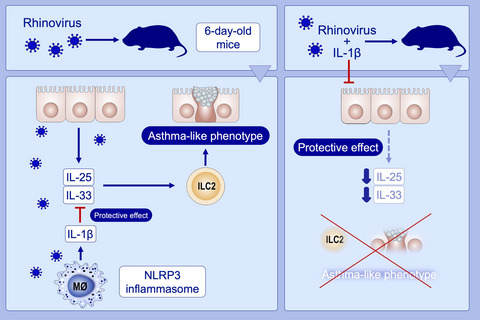Allergy:IL-1β可防止小鼠早期鼻病毒感染后IL-2扩张、2型细胞因子分泌和粘液化生
发布日期:2020-08-14
原标题:IL-1β可防止小鼠早期鼻病毒感染后IL-2扩张、2型细胞因子分泌和粘液化生
方法:给6日龄的野生型或NRLP3-/-小鼠接种假手术或RV-A1B。选择小鼠接受IL-1受体拮抗剂(IL-1RA),抗IL-1β或重组IL-1β的治疗。
结果:鼻病毒感染引起Il25,Il33,Il4,Il5,Il13,muc5ac和gob5 mRNA表达,ILC2扩增,粘液化生和气道高反应性。RV还诱导肺组织pro-IL-1β和NLRP3的mRNA和蛋白表达,以及caspase-1和pro-IL-1β的裂解,表明炎症体的启动和激活。肺巨噬细胞是IL-1β的主要来源。用IL-1RA,抗IL-1β或NLRP3 KO抑制IL-1β信号传导可增加RV诱导的2型细胞因子免疫反应,ILC2数量和粘液化生,同时降低IL-17 mRNA表达。IL-1β的治疗效果相反,降低IL-25、IL-33和粘液化生,同时增加IL-17的表达。IL-1β和IL-17各自抑制培养的气道上皮细胞中Il25、Il33和muc5ac mRNA的表达。最后,与成熟小鼠相比,感染RV的6日龄小鼠IL-1β mRNA和蛋白表达降低。
结论:巨噬细胞IL-1β通过抑制上皮细胞固有细胞因子的表达来限制RV感染后的2型炎症和粘液化生。幼年动物IL-1β分泌减少是早期病毒感染后哮喘发展的机制。

延伸阅读
Allergy
DOI: 10.1111/all.14241
Abstract:
Background: Early‐life wheezing‐associated respiratory infection with human rhinovirus (RV) is associated with asthma development. RV infection of 6‐day‐old immature mice causes mucous metaplasia and airway hyperresponsiveness which is associated with the expansion of IL‐13‐producing type 2 innate lymphoid cells (ILC2s) and dependent on IL‐25 and IL‐33. We examined regulation of this asthma‐like phenotype by IL‐1β.
Methods: Six‐day‐old wild‐type or NRLP3−/− mice were inoculated with sham or RV‐A1B. Selected mice were treated with IL‐1 receptor antagonist (IL‐1RA), anti‐IL‐1β, or recombinant IL‐1β.
Results: Rhinovirus infection induced Il25, Il33, Il4, Il5, Il13, muc5ac, and gob5 mRNA expression, ILC2 expansion, mucus metaplasia, and airway hyperresponsiveness. RV also induced lung mRNA and protein expression of pro‐IL‐1β and NLRP3 as well as cleavage of caspase‐1 and pro‐IL‐1β, indicating inflammasome priming and activation. Lung macrophages were a major source of IL‐1β. Inhibition of IL‐1β signaling with IL‐1RA, anti‐IL‐1β, or NLRP3 KO increased RV‐induced type 2 cytokine immune responses, ILC2 number, and mucus metaplasia, while decreasing IL‐17 mRNA expression. Treatment with IL‐1β had the opposite effect, decreasing IL‐25, IL‐33, and mucous metaplasia while increasing IL‐17 expression. IL‐1β and IL‐17 each suppressed Il25 , Il33, and muc5ac mRNA expression in cultured airway epithelial cells. Finally, RV‐infected 6‐day‐old mice showed reduced IL‐1β mRNA and protein expression compared to mature mice.
Conclusion: Macrophage IL‐1β limits type 2 inflammation and mucous metaplasia following RV infection by suppressing epithelial cell innate cytokine expression. Reduced IL‐1β production in immature animals provides a mechanism permitting asthma development after early‐life viral infection.
First Author:
Mingyuan Han
Correspondence:
Marc B. Hershenson, Departments of Pediatrics, University of Michigan Medical School, Ann Arbor 48109, MI.
All Authors:
Mingyuan Han, Tomoko Ishikawa, Jennifer R. Bermick, Charu Rajput, Jing Lei, Adam M. Goldsmith, Caitlin R. Jarman, Julie Lee, J. Kelley Bentley, Marc B. Hershenson


——浙大迪迅 译
背景:生命早期气喘相关性人鼻病毒(RV)呼吸道感染与哮喘的发展有关。6日龄未成熟小鼠RV感染可导致粘液化生和气道高反应性,这与产生IL-13的2型固有淋巴细胞(ILC2s)的扩张有关,并且依赖于IL-25和IL-33。我们检测了IL-1β对这种哮喘样表型的调节作用。方法:给6日龄的野生型或NRLP3-/-小鼠接种假手术或RV-A1B。选择小鼠接受IL-1受体拮抗剂(IL-1RA),抗IL-1β或重组IL-1β的治疗。
结果:鼻病毒感染引起Il25,Il33,Il4,Il5,Il13,muc5ac和gob5 mRNA表达,ILC2扩增,粘液化生和气道高反应性。RV还诱导肺组织pro-IL-1β和NLRP3的mRNA和蛋白表达,以及caspase-1和pro-IL-1β的裂解,表明炎症体的启动和激活。肺巨噬细胞是IL-1β的主要来源。用IL-1RA,抗IL-1β或NLRP3 KO抑制IL-1β信号传导可增加RV诱导的2型细胞因子免疫反应,ILC2数量和粘液化生,同时降低IL-17 mRNA表达。IL-1β的治疗效果相反,降低IL-25、IL-33和粘液化生,同时增加IL-17的表达。IL-1β和IL-17各自抑制培养的气道上皮细胞中Il25、Il33和muc5ac mRNA的表达。最后,与成熟小鼠相比,感染RV的6日龄小鼠IL-1β mRNA和蛋白表达降低。
结论:巨噬细胞IL-1β通过抑制上皮细胞固有细胞因子的表达来限制RV感染后的2型炎症和粘液化生。幼年动物IL-1β分泌减少是早期病毒感染后哮喘发展的机制。

延伸阅读
Allergy
[IF:6.771]
IL‐1β prevents ILC2 expansion, type 2 cytokine secretion, and mucus metaplasia in response to early‐life rhinovirus infection in miceDOI: 10.1111/all.14241
Abstract:
Background: Early‐life wheezing‐associated respiratory infection with human rhinovirus (RV) is associated with asthma development. RV infection of 6‐day‐old immature mice causes mucous metaplasia and airway hyperresponsiveness which is associated with the expansion of IL‐13‐producing type 2 innate lymphoid cells (ILC2s) and dependent on IL‐25 and IL‐33. We examined regulation of this asthma‐like phenotype by IL‐1β.
Methods: Six‐day‐old wild‐type or NRLP3−/− mice were inoculated with sham or RV‐A1B. Selected mice were treated with IL‐1 receptor antagonist (IL‐1RA), anti‐IL‐1β, or recombinant IL‐1β.
Results: Rhinovirus infection induced Il25, Il33, Il4, Il5, Il13, muc5ac, and gob5 mRNA expression, ILC2 expansion, mucus metaplasia, and airway hyperresponsiveness. RV also induced lung mRNA and protein expression of pro‐IL‐1β and NLRP3 as well as cleavage of caspase‐1 and pro‐IL‐1β, indicating inflammasome priming and activation. Lung macrophages were a major source of IL‐1β. Inhibition of IL‐1β signaling with IL‐1RA, anti‐IL‐1β, or NLRP3 KO increased RV‐induced type 2 cytokine immune responses, ILC2 number, and mucus metaplasia, while decreasing IL‐17 mRNA expression. Treatment with IL‐1β had the opposite effect, decreasing IL‐25, IL‐33, and mucous metaplasia while increasing IL‐17 expression. IL‐1β and IL‐17 each suppressed Il25 , Il33, and muc5ac mRNA expression in cultured airway epithelial cells. Finally, RV‐infected 6‐day‐old mice showed reduced IL‐1β mRNA and protein expression compared to mature mice.
Conclusion: Macrophage IL‐1β limits type 2 inflammation and mucous metaplasia following RV infection by suppressing epithelial cell innate cytokine expression. Reduced IL‐1β production in immature animals provides a mechanism permitting asthma development after early‐life viral infection.
First Author:
Mingyuan Han
Correspondence:
Marc B. Hershenson, Departments of Pediatrics, University of Michigan Medical School, Ann Arbor 48109, MI.
All Authors:
Mingyuan Han, Tomoko Ishikawa, Jennifer R. Bermick, Charu Rajput, Jing Lei, Adam M. Goldsmith, Caitlin R. Jarman, Julie Lee, J. Kelley Bentley, Marc B. Hershenson
2020-08-12 Article
创建过敏性疾病的科研、科普知识交流平台,为过敏患者提供专业诊断、治疗、预防的共享平台。

 杭州浙大迪迅生物基因工程有限公司
杭州浙大迪迅生物基因工程有限公司

